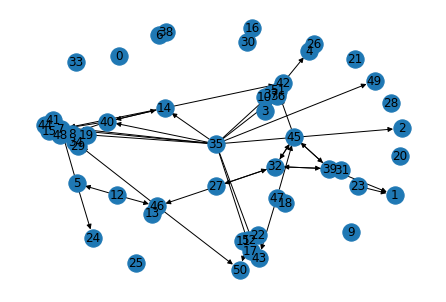Lib for NebulaGraph integration with Deep Graph Library (DGL).
Project description
nebula-dgl
nebula-dgl is the Lib for Nebula Graph integration with Deep Graph Library (DGL).
nebula-dgl is still WIP, there is a demo project here .
Guide
Installation
Install from PyPi
python3 -m pip install nebula-dgl
python3 -m pip install dgl dglgo -f https://data.dgl.ai/wheels/repo.html
Install from codebase for dev
python3 -m pip install nebula3-python
python3 -m pip install dgl dglgo -f https://data.dgl.ai/wheels/repo.html
# build and install
python3 -m pip install .
Playground
Clone this repository to your local directory first.
git clone https://github.com/wey-gu/nebula-dgl.git
cd nebula-dgl
- Deploy NebulaGraph playground with Nebula-UP:
Install NebulaGraph:
curl -fsSL nebula-up.siwei.io/install.sh | bash
Load example data:
~/.nebula-up/load-basketballplayer-dataset.sh
- Create a jupyter notebook in same docker network:
nebula-net
docker run -it --name dgl -p 8888:8888 --network nebula-net \
-v "$PWD":/home/jovyan/work jupyter/datascience-notebook \
start-notebook.sh --NotebookApp.token='secret'
Now you can either:
- access the notebook at http://localhost:8888/lab/tree/work?token=secret and create a new notebook.
Or:
- run ipython with the container:
docker exec -it dgl ipython
cd work
- Install nebula-dgl in notebook:
Install nebula-dgl:
!python3 -m pip install python3 -m pip install nebula3-python==3.3.0
!python3 -m pip install dgl dglgo -f https://data.dgl.ai/wheels/repo.html
!python3 -m pip install .
- Try with a homogeneous graph:
import yaml
import networkx as nx
from nebula_dgl import NebulaLoader
nebula_config = {
"graph_hosts": [
('graphd', 9669),
('graphd1', 9669),
('graphd2', 9669)
],
"nebula_user": "root",
"nebula_password": "nebula",
}
with open('example/homogeneous_graph.yaml', 'r') as f:
feature_mapper = yaml.safe_load(f)
nebula_loader = NebulaLoader(nebula_config, feature_mapper)
homo_dgl_graph = nebula_loader.load()
# or query based
query = """
MATCH p=()-[:follow]->() RETURN p
"""
nebula_loader = NebulaLoader(nebula_config, feature_mapper, query=query, query_space="basketballplayer")
homo_dgl_graph = nebula_loader.load()
nx_g = homo_dgl_graph.to_networkx()
nx.draw(nx_g, with_labels=True, pos=nx.spring_layout(nx_g))
Result:
- Compute the degree centrality of the graph:
nx.degree_centrality(nx_g)
Result:
{0: 0.0,
1: 0.04,
2: 0.02,
3: 0.02,
4: 0.06,
5: 0.06,
6: 0.04,
7: 0.24,
8: 0.16,
9: 0.0,
10: 0.02,
11: 0.04,
12: 0.04,
13: 0.04,
14: 0.1,
15: 0.04,
16: 0.0,
17: 0.1,
18: 0.04,
19: 0.04,
20: 0.0,
21: 0.0,
22: 0.04,
23: 0.02,
24: 0.02,
25: 0.04,
26: 0.06,
27: 0.0,
28: 0.02,
29: 0.0,
30: 0.04,
31: 0.12,
32: 0.04,
33: 0.22,
34: 0.14,
35: 0.1,
36: 0.04,
37: 0.14,
38: 0.1,
39: 0.02,
40: 0.14,
41: 0.08,
42: 0.1,
43: 0.12,
44: 0.12,
45: 0.08,
46: 0.1,
47: 0.02,
48: 0.04,
49: 0.12,
50: 0.06}
Nebula Graph to DGL
from nebula_dgl import NebulaLoader
nebula_config = {
"graph_hosts": [
('graphd', 9669),
('graphd1', 9669),
('graphd2', 9669)
],
"nebula_user": "root",
"nebula_password": "nebula"
}
# load feature_mapper from yaml file
with open('example/nebula_to_dgl_mapper.yaml', 'r') as f:
feature_mapper = yaml.safe_load(f)
nebula_loader = NebulaLoader(nebula_config, feature_mapper)
dgl_graph = nebula_loader.load()
Play homogeneous graph algorithms in networkx
import networkx
with open('example/homogeneous_graph.yaml', 'r') as f:
feature_mapper = yaml.safe_load(f)
nebula_loader = NebulaLoader(nebula_config, feature_mapper)
homo_dgl_graph = nebula_loader.load()
nx_g = homo_dgl_graph.to_networkx()
# plot it
networkx.draw(nx_g, with_lables=True)
# get degree
networkx.degree(nx_g)
# get degree centrality
networkx.degree_centrality(nx_g)
Multi-Part Loader for Nebula Graph
- For now, the Multi-Part Loader is slow like sequence scan, need to profile the performance.
import yaml
import networkx as nx
import matplotlib.pyplot as plt
from nebula_dgl import NebulaReducedLoader
nebula_config = {
"graph_hosts": [
('127.0.0.1', 9669)
],
"nebula_user": "root",
"nebula_password": "nebula",
}
with open('example/homogeneous_graph.yaml', 'r') as f:
feature_mapper = yaml.safe_load(f)
# you only need change the following line: from NebulaLoader to NebulaReducedLoader
# Easy for you to use the multi-part loader
nebula_reduced_loader = NebulaReducedLoader(nebula_config, feature_mapper)
homo_dgl_graph = nebula_reduced_loader.load()
nx_g = homo_dgl_graph.to_networkx()
nx.draw(nx_g, with_labels=True, pos=nx.spring_layout(nx_g))
plt.savefig("multi_graph.png")
Project details
Release history Release notifications | RSS feed
Download files
Download the file for your platform. If you're not sure which to choose, learn more about installing packages.
Source Distribution
nebula-dgl-0.1.2.tar.gz
(17.1 kB
view details)
Built Distribution
File details
Details for the file nebula-dgl-0.1.2.tar.gz.
File metadata
- Download URL: nebula-dgl-0.1.2.tar.gz
- Upload date:
- Size: 17.1 kB
- Tags: Source
- Uploaded using Trusted Publishing? No
- Uploaded via: pdm/2.8.0a2 CPython/3.11.4
File hashes
| Algorithm | Hash digest | |
|---|---|---|
| SHA256 | cdde6e0f91b100fcd7e2826519b3c063ef99569ddde81142a785f94d19316187 |
|
| MD5 | 005c76d8ae2479cf14435460611106b5 |
|
| BLAKE2b-256 | 3e7efb4a92a238db03f2bedb15e14cfcc6a9931ea3e4b894be7428cee2118790 |
File details
Details for the file nebula_dgl-0.1.2-py3-none-any.whl.
File metadata
- Download URL: nebula_dgl-0.1.2-py3-none-any.whl
- Upload date:
- Size: 18.1 kB
- Tags: Python 3
- Uploaded using Trusted Publishing? No
- Uploaded via: pdm/2.8.0a2 CPython/3.11.4
File hashes
| Algorithm | Hash digest | |
|---|---|---|
| SHA256 | 3d1a66844991bc9b742eb3568f9506a83fe00d11ff7675b66d8e9195bd14d725 |
|
| MD5 | 41feabae3e8af265f8d130165c5c9432 |
|
| BLAKE2b-256 | 6d78c07ba864b3517e17f2eaea877d4801032a6ee520435cf370c3ab2a077bf9 |














